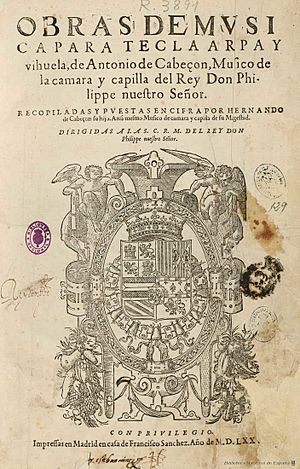Hernando de Cabezón facts for kids
Hernando de Cabezón was a Spanish composer and organist. He was born around September 7, 1541, and died on October 1, 1602. Hernando was the son of the famous musician Antonio de Cabezón. Today, we only have a few of his own musical pieces. He is mostly remembered for publishing a large collection of his father's music.
Contents
Life of a Royal Musician
Early Life and Career
Hernando de Cabezón was born in Madrid, Spain. He likely learned music from his father, Antonio de Cabezón. His father was a very important musician at the royal court. From January to December 1559, Hernando worked as a substitute organist at the royal chapel. This was the same place his father worked.
In 1563, he became the organist for the Sigüenza Cathedral. This was an important position.
Serving the King
When his father passed away in 1566, Hernando took over his role. He became the royal organist for the King of Spain. Like his father, Hernando traveled with the royal court. This meant he visited many places, including Portugal, where he lived from 1580 to 1581.
In 1598, Philip II of Spain died. Hernando continued to serve as royal organist for the new king, Philip III of Spain. Hernando made his will in 1598. He died four years later in Valladolid, Spain.
His Musical Legacy
Publishing His Father's Work
Not many of Hernando de Cabezón's own musical pieces have survived. He is mainly known for a very important book of music. This book was called Obras de música para tecla, arpa y vihuela. It was published in Madrid in 1578.
This large collection mostly contained music by his father, Antonio de Cabezón. It also included five pieces written by Hernando himself. The Obras is the most important source we have for Antonio de Cabezón's music.
Hernando's Own Music
Hernando's own surviving works include an organ piece called Ave maris stella. He also wrote several keyboard intabulations. An intabulation is when a piece of vocal music is rewritten for an instrument like a keyboard.
These pieces by Hernando are considered to be of very high quality. His intabulations are special because they often changed the original vocal songs quite a bit.
See also
 In Spanish: Hernando de Cabezón para niños
In Spanish: Hernando de Cabezón para niños
 | Frances Mary Albrier |
 | Whitney Young |
 | Muhammad Ali |


